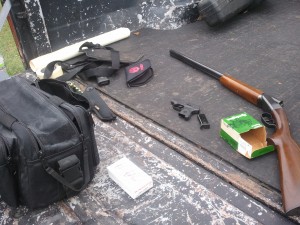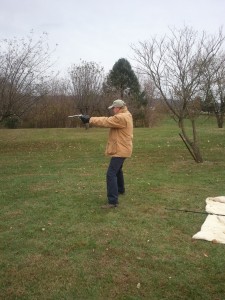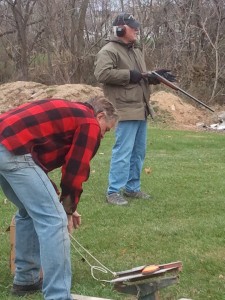One day after the election I visited my brother and brother-in-law, two conservative Republicans; we loaded up handguns and a shotgun and spent two hours shooting clay  birds and a target under a sky heavy with snow. Before we walked to the edge of a woods and a splintered backstop made of wooden beams, they took turns spinning two of the grandchildren inside a cardboard box. One child stepped into it, pulled the flaps shut and immediately started squealing and laughing. Then the other had her turn. Earlier my sister played hide and seek with them outside; I watched the little boy, an arctic hat with side-flaps encasing his blond head, trying to wedge himself between a tree and a shed, his sister rushing from bush to bush, blond hair streaming behind her. They both ran around like happy maniacs.
birds and a target under a sky heavy with snow. Before we walked to the edge of a woods and a splintered backstop made of wooden beams, they took turns spinning two of the grandchildren inside a cardboard box. One child stepped into it, pulled the flaps shut and immediately started squealing and laughing. Then the other had her turn. Earlier my sister played hide and seek with them outside; I watched the little boy, an arctic hat with side-flaps encasing his blond head, trying to wedge himself between a tree and a shed, his sister rushing from bush to bush, blond hair streaming behind her. They both ran around like happy maniacs.
We talked about plans for Thanksgiving dinner, the return of a Marine son from his Afghanistan deployment, the effects of Sandy, deer camp, carry permits, gun safety, how to aim a handgun, hit a clay bird on the fly and keep a weapon clean and oiled. No one mentioned what had happened on Tuesday.
Guns were never an issue for my brother and sisters and I. My father, a State Police officer, slung his .38 revolver and its belt and holster over a clothes rack in the mud room outside our kitchen. None of us ever touched it. It was a part of our lives, that’s all — a tool he might have to use to arrest a bad guy; a part of his persona, like his uniform and patrol car and Smokey-the-Bear Hat. Upon his death he left me his 20 gauge Winchester shotgun, a pre-war memento from his small game days well before my entrance into his life.
 Once we got down to business, Fred and Jack and I lifted the guns, adjusted our hands and feet, steadied, aimed and fired. We worked our way through a .380 automatic, small as my palm; a 9 millimeter Ruger, a feather-trigger.22 Browning , the shotgun and a .44 revolver. When I fired that weapon, I felt as if I were holding Thor’s hammer in all its power in my fists.
Once we got down to business, Fred and Jack and I lifted the guns, adjusted our hands and feet, steadied, aimed and fired. We worked our way through a .380 automatic, small as my palm; a 9 millimeter Ruger, a feather-trigger.22 Browning , the shotgun and a .44 revolver. When I fired that weapon, I felt as if I were holding Thor’s hammer in all its power in my fists.
I liked firing the shotgun the most. On my last cartridge I cracked apart the red-orange clay bird released by Jack from a Thrower that he  cinched into place each time through muscle. It rose above the apple trees and, shotgun to shoulder, I tracked it, covered it and fired. I felt a surge of satisfaction that this was a skill I could acquire with time and practice, but more than that — this gun tied me to my father, to a body once as arced and focused as mine had just been.
cinched into place each time through muscle. It rose above the apple trees and, shotgun to shoulder, I tracked it, covered it and fired. I felt a surge of satisfaction that this was a skill I could acquire with time and practice, but more than that — this gun tied me to my father, to a body once as arced and focused as mine had just been.
We cleaned the guns in the cellar on an old coffee table under Frederic Remington’s print A Dash For Timber. When I reached into the shotgun’s original carrying case, canvas and cracked leather, I unexpectedly pulled out a slip of paper in my father’s handwriting – a list of 6 dates when he had cleaned the weapon most recently – 6.25.87, 9.17.87, 3.14.88, and so on.
We talked in low tones as we worked — Jack the teacher, me the student, the cellar made comfortable by the wood stove, by the presence of brothers, and by the Winchester I cradled and oiled. When I finished, I added the date of this cleaning, folded it and slipped in back into the case.